News and Announcements
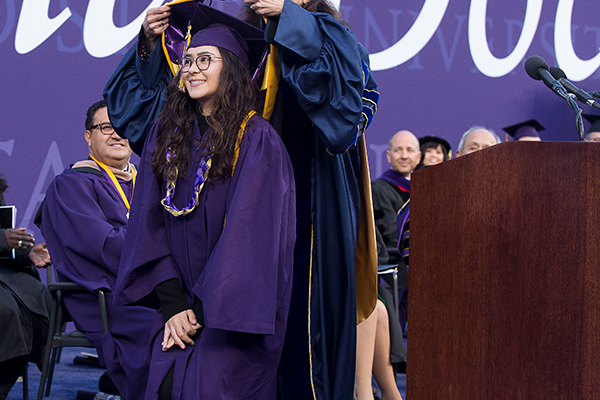
A dozen outstanding graduates will be honored during San Francisco State University’s 122st Commencement ceremony, to be held at Oracle Park Friday, May 26. They will represent their more than 7,900 graduating peers in the Class of 2023.
As part of a longstanding tradition, each of the University’s six academic colleges selects an undergraduate and a graduate student to represent their classmates and wear their college’s academic hood during the ceremony. Additionally, two of the hood recipients, one undergraduate and one graduate student, will deliver a Commencement address.
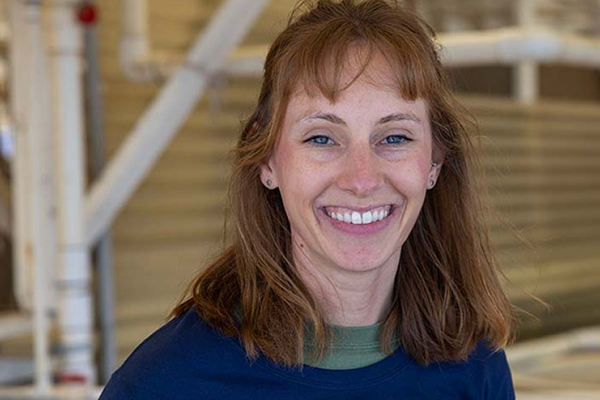
The coastal city of Sausalito is no stranger to the impacts of climate change, particularly sea level rise. Now SF State alumna Catie Thow Garcia (M.S., ’22) has been named Sausalito’s first resiliency and sustainability manager to help mitigate the potential consequences of climate change.
In this new role, Thow Garcia will work on projects related to climate change, energy efficiency, shore habitat protection and sea level rise. The job will require her to work closely with government agencies, community groups, nonprofit organizations and local experts in energy and waste reduction, solar implementation and more.
“It’s one of the reasons why I was really interested in working at the local level rather than at the state level …,” Thow Garcia said of all the collaborations in her future. “I’m excited to see where it takes me, but I recognize that there’s still a lot of learning to do on my part.”
It’s the type of integrative and collaborative work that originally brought the New England native to the Bay Area. She was drawn to SF State’s Estuary and Ocean Science (EOS) Center’s master’s program in Interdisciplinary Marine and Estuary Sciences (IMES). As a graduate student, she also collaborated with San Francisco Bay National Estuarine Research Reserve where she began working on coastal resilience. An environmental field scientist by training, she didn’t want to just learn about marine biology but wanted to know how it intersected with botany, water-land interactions, social science and economics.
“It’s why I drove 3,000 miles across the United States to come study here,” added Thow Garcia, who is originally from Rhode Island and was living in Colorado before moving to the Bay Area. After graduating, she was named a 2022 California Sea Grant State Fellow and worked with the California State Coastal Conservancy to support Bay restoration efforts. She plans to channel all of this training into her new position while expanding her knowledge in sustainability and resiliency.
Sausalito is in Marin County just like the EOS Center so Thow Garcia is familiar with the needs and environmental issues in the area. She also believes her experiences in sea level rise adaptations helped her get the position. She’s particularly interested in nature-based adaptations incorporating live organisms, something she learned about as an undergraduate but first saw in practice at the EOS Center.
“For nature-based solutions, there’s a scale we call green to gray. Gray being just the hardened sea wall and green being something purely green, like oysters [or] grass beds,” Thow Garcia explained. “To me nature-based solutions mean finding somewhere on that spectrum that’s not purely gray.” An example of this could be a horizontal levee that is wider than a traditional levee, allowing migration space for plants and animals as sea level rises.
Though she decided to stay local, Thow Garcia says she’s aware of EOS Center alumni who work in local, county, state and federal government jobs throughout the United States.
“That spread of knowledge is really special and it all started with this little tiny marine science campus in Tiburon,” said the alumna proudly.
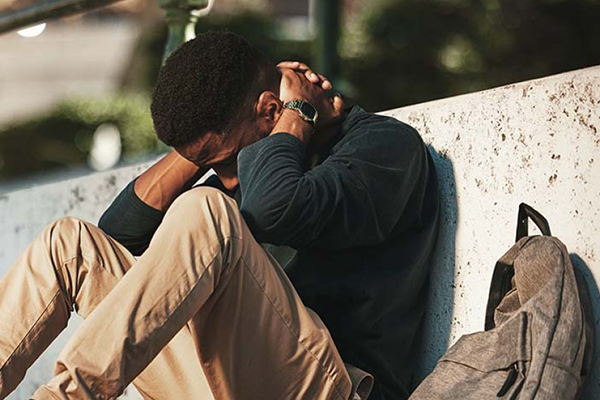
Mental health discussions are hard and are layered by issues of culture, gender, age, economic status and more. Five SF State students — all men of color — led a public virtual panel called “Not So Soft” on Friday, May 12, at 6 p.m. to talk about mental health in their communities. The event is a partnership with One East Palo Alto, a community-based organization that serves youth and families from marginalized communities and provides mental health and substance use programming.
“The ‘Not So Soft’ title actually stemmed from a conversation we were having in class where we were talking about my uncle telling me all the time that our generation is soft and that we’re not the same as men were back then,” said Biology major Victor Gutierrez, who spoke at the event. “The reason why we called this ‘Not So Soft’ is because we wanted to show that it’s OK for men to talk about their mental health and deal with those things.”
The five panelists — Gutierrez, Naeem Seif Hopkins, Antoine Evans, Jason Shin and Adriel Evaristo — are covering underage trauma, cannabis/substance use, Asian mental health, community health education on depression and mental health among youth with disabilities. Each student conducted research on different topics based on their personal experiences and interests.
Gutierrez, who is new to exploring his mental health, is part of the Latino community in the Bay Area and is going to speak about underage trauma. Hopkins, a Studio Art major, is going to tackle cannabis use among youth.
“We’re still youth ourselves and we’re figuring out manhood and debunking things from our past — and we’re all men of color. Taking into context our cultural context, as well, our view of masculinity and manhood might look different [depending on] each background that we come from,” Hopkins said. He and his classmates are still learning about their own mental health and what they need, he adds.
The five student panelists met while taking “Research with Communities,” an upper-division Biology course exploring the biological and social determinants of health and improving the well-being of communities. This semester’s class focused on the Community Health Needs Assessment for San Mateo County to make it more useful for community members. The students were mentored by Tania Perez, a health-equity consultant and special consultant at the University, and Professor of Biology Leticia Márquez-Magaña.
Gutierrez, Hopkins and the other three panelists were brought together by their interests in behavior and mental health. While this group is doing a public panel, other students in the class worked on community health education projects, provided public comments at board meetings and more.
Hopkins and Gutierrez credit their course instructors for giving them space in a class to explore mental health in their own communities, grow from these conversations and encourage a healing environment.
“I like to speak about [these topics] because I have gone through some things in my life,” Gutierrez explained. “I’ve never really dealt with them until this class or talked about them or seen how many people in the world actually go through the same things as us. It kind of made me feel like I wasn’t alone.”
After the May 30 issue, CampusMemo will go to a monthly schedule for the summer. New issues will appear June 12 and July 17. Weekly publication will resume with the Aug. 14 issue.
Students, staff and faculty are invited to meet with Provost Amy Sueyoshi during her open office hours. Meetings will occur 8 – 9 a.m. on varying Thursdays through December depending on the provost’s availability.
Please reserve your time to discuss any topics. All meetings will be at the Provost’s Office in ADM 455. Visit this Qualtrics link to reserve your meeting. Breakfast refreshments will be provided.
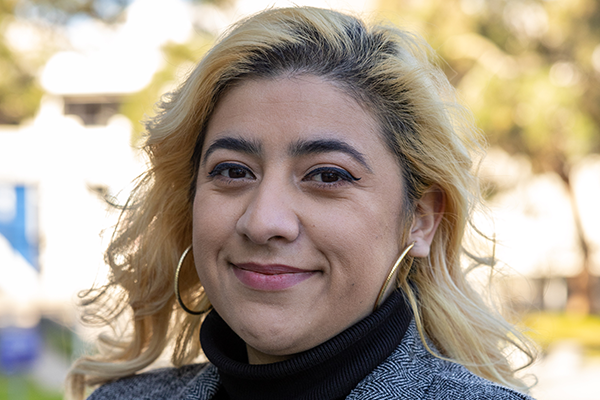
Bibiana Arriola was recently appointed director of advisor development and college advisors. Arriola has been serving in the interim role since June 2022.
Arriola brings a wealth of experience to this position, having held a variety of advising and leadership roles at SF State and San José State. She will support a team of academic advisors in the Undergraduate Advising Center who serve students in the Lam Family College of Business, College of Ethnic Studies and Graduate College of Education.
She earned a B.A. in English and art history from the University of California, Berkeley and an M.A. in education with a concentration in counseling from San José State University.
“Bibiana Arriola will play a pivotal role in supporting professional staff advisors as we adopt a new model for undergraduate advising on campus,” said Vice Provost of Academic Planning and Dean of Undergraduate Education Lori Beth Way. “We look forward to further developing our new one-stop model for advising with Arriola in place as a key member of our leadership team.”
Did you know that staff and faculty can purchase over-the-counter products at a reasonable price at the Student Health Services pharmacy? Visit our online list of over-the-counter products and prices.
Fees will be charged to your bursar’s account and payment can be done online or at the Bursar’s Office. Prices and products are subject to change. Generic equivalent products are used when available.
The SF State Academic Senate met on Tuesday, May 9, at Seven Hills Conference Center and via Zoom. A summary of the meeting follows. During the meeting, The Senate passed the following items:
- Grading Policy (new).
- Policy on Departmental By-Laws.
- S23-180 Revision to S19-180 Search Committees for San Francisco State University Administrators Policy.
- Resolution to Reinstate and Recast the Teaching Effectiveness Assessment Task Force.
- S23-24 Revision to S06-24 the All-University Committee on Disability charge.
- B.A. in Child Development Pre – K to Third Grade, new program
- B.A. in Women and Gender Studies, Reducing units > 20% from 39 to 30 units
- Minor in California Studies Reducing units >20% from 21 to 15 units
- Minor in Pacific Asian Studies, Transfer Administrative Housing
- B.A. in Business, Concentration in Business Analytics
- Certificate in Teaching Post-Secondary Reading, Distance Education Authorization
- B.S. in Hospitality and Tourism Management, Distance Education Authorization
- Certificate in Teaching Post-Secondary Reading, Distance Education Authorization
- Certificate in Teaching of Composition, Distance Education Authorization
- M.A. in Composition, Distance Education Authorization
- B.A. in Creative Writing, Distance Education Authorization
The full agenda, meeting materials and minutes can be found on the senate website.
The Office of International Programs and the Division of International Education invite faculty to apply to teach abroad the summer 2024 at our bilateral exchange partner, the University of Aarhus. The deadline to apply for summer 2024 is in early August 2023.
Visit the University of Aarhus website for more information.
During the last two weeks of the semester, the J. Paul Leonard Library encourages students to stay late to study, refresh and refuel — and get support in the ways they prefer.
- The Library’s late study areas are open an hour longer Monday – Thursday (until midnight) and three extra hours on Sunday (until 9 p.m.), May 13 – 26.
- The Events Room (LIB 121) is reimagined as the Wellness Room, a study and relaxation space stocked with puzzles and games, coloring and origami, and light snacks courtesy of Food+Shelter+Success.
- Librarians and peer mentors provide research help and answer questions online and in person, and the Tutoring and Academic Support Center (LIB 220) offers drop-in tutoring and appointments.
Faculty and staff are encouraged to share Wellness Weeks information with students. More details can be found on the Library's website. For information contact Melanie Smith, first-year experience librarian.
The SF State Academic Senate will meet Tuesday, May 16, from 2 to 4:30 p.m. virtually via Zoom and in person at Seven Hills for its 16th meeting of the academic year. Visitors who wish to attend please contact the Senate office at senate@sfsu.edu for a Zoom link.
The agenda includes:
- 2022 – 2023 Senate, Final Plenary 2 – 2:45 p.m. (time approximate)
- Recommendation from Executive Committee Commendation Honoring California State University Academic Senator Nancy Gerber (serving 2020 – 2023), consent item.
- Recommendation from the Executive Committee Commendation in Honor of Alvin Alvarez, dean of the College of Health & Social Sciences, consent item.
- Recommendation from Executive Committee Commendation in Honor and Recognition of Outgoing Members of the Academic Senate, consent item.
- Presentation from the Distinguished Faculty and Staff Award Committee, “Awarding Recipients of Distinguished Faculty and Staff Awards,” (time approximate 2:15 p.m.)
- 2023 – 2024 Senate, Opening Plenary 2:45 – 3:30 p.m. (time approximate)
- Welcome from Senate Chair
- Election of Chair, Vice Chair, Secretary, At-large positions and Standing Committee Chairs
The full agenda, meeting materials and minutes can be found on the senate website.
The University Budget Committee (UBC) invites all campus members to attend the last meeting of the semester on Thursday, May 18, from 10 a.m. to noon via Zoom. Presentations include the Cost Recovery (“chargeback”) Governance Committee and budget strategies from Academic Affairs and University Enterprises.
Additionally, UBC members who are staff and faculty offer peer-hosted “Office Hours” on Fridays after the meetings to share thoughts about University finance topics or clarify anything heard at the budget meetings. The next is on Friday, May 19, from 11 a.m. to noon via Zoom.
All UBC meetings and Office Hours welcome persons with disabilities and may provide reasonable accommodations upon request. RSVP to ubc@sfsu.edu.
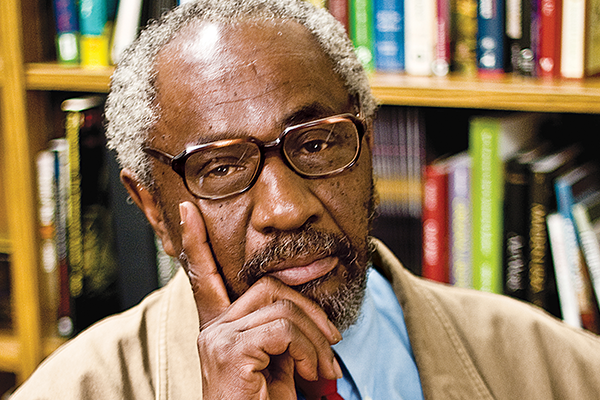
Political Science Professor Emeritus Robert C. Smith passed away on April 13. He was 76.
Smith taught and wrote on race and American politics for more than 35 years, publishing a multitude of articles and books, including “Race, Class and Culture: A Study in Afro-American Mass Opinion and Leadership,” “The Impact of Ronald W. Walters on African American Thought and Leadership” and “Polarization and the Presidency: From FDR to Barack Obama.” He joined the SF State faculty in 1989 and retired in 2020.
Smith completed his undergraduate work with honors at UC Berkeley. He earned a master’s degree from UCLA and a Ph.D. from Howard University, which gave him the Distinguished Ph.D. Alumni Award in 1998. He was also an associate editor of the National Political Science Review and co-author of the textbook “American Politics and the African American Quest for Universal Freedom” and the “Encyclopedia of African American Politics.”
Alongside his academic contributions, Smith made frequent media appearances analyzing the racial dimensions of American politics.
Smith had an encyclopedic knowledge of U.S. presidents. His abiding interest (but not his only one by a long shot) was how various administrations dealt with racial issues. One of his later contributions to the literature was a discussion of how U.S. conservativism was inherently related to anti-Blackness.
Smith will be remembered as a beloved teacher in the Political Science Department. He spoke softly, requiring students to pay close attention. They were rewarded with his brilliant insights and deep knowledge of American politics. A scholar of great national prominence, he brought a huge amount to the program; his colleagues and former students still miss him dearly. His passing is a great loss, not only for his family and the Department of Political Science but also for the discipline as a whole.
“Robert will be remembered in academia as a quintessential scholar-teacher,” said Sherri L. Wallace, one of Smith’s coauthors and a professor at University of Louisville, in an obituary from the National Conference of Black Political Scientists. “He was inquisitive and a prolific writer until the end. Yet, after a visit to his home, spending time with him and with his family, I realized what he valued most in life was his unwavering devotion and love shared with his wife, Scottie — the love of his life — and their children and grandchildren, Blanch, Jessica, Scottus-Charles, Karysa and Grayson. This is his most cherished legacy.”
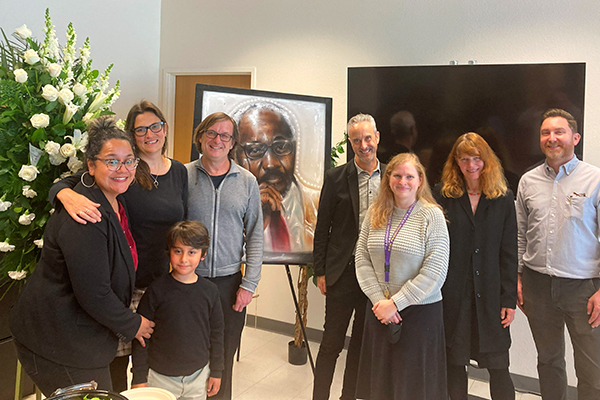
SF State Spotlight
An April 18 report in The Wall Street Journal lists SF State as the No. 5 public college nationwide for accounting salaries for graduates.
Analyzing experience and pay data from Lightcast and Glassdoor, the ranking finds that SF State bachelor’s degree recipients in Accounting earn an average annual salary of $76,140 in their first 10 years. The median nationwide is $67,717.
In a May 3 story in the Chronicle of Higher Education, President Lynn Mahoney discusses free speech issues on college campuses when controversial, bigoted speakers visit.
Mahoney identifies three principles: protect free speech, address the harm and “keep these speakers from having the best day of their lives.”
“I can’t undo the emotional harm that a Riley Gaines does to trans women who want to participate in student athletics,” Mahoney said. “But I can at least hope that we provide the support to address that emotional harm.”
Associate Professor of American Indian Studies Robert Keith Collins is the editor of “Studying African-Native Americans: Problems, Perspectives and Prospects” (Routledge Press). This book examines the academic study of the African and Native American contact, African cultural change in Native America and the existence of African Americans with Native American ancestry and Native Americans with African ancestry in the Western Hemisphere.
Drawing upon the fields of anthropology, history and sociology that initiated research into these areas, this book attempts to provide understandings of how scholars have studied and continue to understand the experiences of African-Native Americans or individuals of blended — culturally and/or racially — African and Native American ancestry in North, Central and South America. It aims to illuminate problems, perspectives and prospects for interdisciplinary research.
The first part is structured to cover the problems — past and present — encountered in investigating the scope of the topic and presents an overview of the most important academic findings. The second part provides both anthropological and interdisciplinary perspectives on the lived experiences of African-Native Americans with both Native Americans and non-Native Americans. And, finally, it sketches out future directions in scholarship.
This book will be of interest to anthropologists, historians, sociologists and ethnic studies and Native American and Indigenous studies scholars, from undergraduates interested in the topic to graduate students and researchers seeking to interrogate past research or fill explanatory gaps in the literature with new research.
Communication Studies Assistant Professor Vivian Huang is the author of an April 28 opinion piece in Frieze about performance artist Tehching Hsieh’s “One Year Performance 1980 – 1981 (Time Clock Piece) (1980 – 1981).” The performance involved Hsieh punching a time clock every hour for an entire year in his New York studio.
“Hsieh’s work shows how the access and surveillance of documentation can forestall curiosity for the greater process — whether in art or in life,” Huang wrote.
Lecturer of Criminal Justice Studies Jim Dudley recently moderated a live panel of three experts on “Developing effective strategies to prevent and respond to school shootings” for Police1. The panel discussion outlines the knowledge and skills law enforcement and educators need to develop effective strategies for preventing and responding to school shootings.
Latina/Latino Studies Lecturer Emeritus Felix Kury is interviewed at length in a KQED feature story published May 3 about his participation in a 1990s boycott of companies that bought coffee beans from El Salvador. The Central American country was experiencing widespread economic inequality and a long, brutal civil war.
“Salvadorans needed agrarian reform, immediate education and health care,” Kury said. “... All of us began to say, ‘What do we do? We have to go beyond working with Salvadorans to develop a movement.’”
As television and film production has ground to a halt due to a strike by writers, Cinema Professor Julian Hoxter provides context in a May 2 story in The Atlantic.
Hoxter, a screenwriter and author of several books on writing for Hollywood, notes that an inconsistency among productions, lower budgets and risk-averse studios in the streaming era have left writers feeling underpaid and expendable. Over the decades the Writers Guild of America has consistently gone on strike when “new developments in distribution and exhibition technologies” have emerged, he adds.
Marc Stein, the Jamie and Phyllis Pasker Professor of History, writes a satirical opinion piece for History News Network about Florida Gov. Ron DeSantis. Published on May 7, “Let Us Now Praise R. DeSantis” touches on the politician’s banning of discussions of gender, sexuality and racism in schools.
“And when you, R. DeSantis, are written up in future history textbooks, Florida’s children will be able to commemorate your fight against M. Mouse and D. Duck,” Stein wrote.